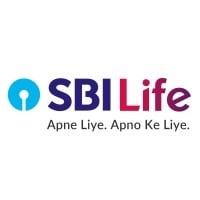
Berkshire Hathaway
None



None

SBI Life Insurance (‘SBI Life’ / ‘The Company’), one of the most trusted life insurance companies in India, was incorporated in October 2000 and is registered with the Insurance Regulatory and Development Authority of India (IRDAI) in March 2001. Serving millions of families across India, SBI Life’s diverse range of products caters to individuals as well as group customers through Protection, Pension, Savings and Health solutions. Driven by ‘Customer-First’ approach, SBI Life places great emphasis on maintaining world class operating efficiency and providing hassle-free claim settlement experience to its customers by following high ethical standards of service. Additionally, SBI Life is committed to enhance digital experiences for its customers, distributors and employees alike. SBI Life strives to make insurance accessible to all, with its extensive presence across the country through its 1,110 offices, 26,355 employees, a large and productive network of about 240,304 agents, 60 corporate agents and 13 bancassurance partners with more than 41,000 partner branches, 141 brokers and other insurance marketing firms. In addition to doing what’s right for the customers, the company is also committed to provide a healthy and flexible work environment for its employees to excel personally and professionally. SBI Life strongly encourages a culture of giving back to the society and has made substantial contribution in the areas of child education, healthcare, disaster relief and environmental upgrade. In 2024-25, the Company touched over 50,000 direct beneficiaries through various CSR interventions Listed on the Bombay Stock Exchange ('BSE') and the National Stock Exchange ('NSE'), the company has an authorized capital of Rs. 20.0 billion and a paid-up capital of Rs. 10.0 billion. The AuM is Rs.4,480.4 billion. For more information, please visit our website—www.sbilife.co.in. (Numbers & data mentioned above are for the year ended March 31, 2025)
Security & Compliance Standards Overview












No incidents recorded for Berkshire Hathaway in 2025.
No incidents recorded for SBI Life Insurance Co. Ltd. in 2025.
Berkshire Hathaway cyber incidents detection timeline including parent company and subsidiaries
SBI Life Insurance Co. Ltd. cyber incidents detection timeline including parent company and subsidiaries
Last 3 Security & Risk Events by Company
Angular is a development platform for building mobile and desktop web applications using TypeScript/JavaScript and other languages. Prior to versions 19.2.16, 20.3.14, and 21.0.1, there is a XSRF token leakage via protocol-relative URLs in angular HTTP clients. The vulnerability is a Credential Leak by App Logic that leads to the unauthorized disclosure of the Cross-Site Request Forgery (XSRF) token to an attacker-controlled domain. Angular's HttpClient has a built-in XSRF protection mechanism that works by checking if a request URL starts with a protocol (http:// or https://) to determine if it is cross-origin. If the URL starts with protocol-relative URL (//), it is incorrectly treated as a same-origin request, and the XSRF token is automatically added to the X-XSRF-TOKEN header. This issue has been patched in versions 19.2.16, 20.3.14, and 21.0.1. A workaround for this issue involves avoiding using protocol-relative URLs (URLs starting with //) in HttpClient requests. All backend communication URLs should be hardcoded as relative paths (starting with a single /) or fully qualified, trusted absolute URLs.
Forge (also called `node-forge`) is a native implementation of Transport Layer Security in JavaScript. An Uncontrolled Recursion vulnerability in node-forge versions 1.3.1 and below enables remote, unauthenticated attackers to craft deep ASN.1 structures that trigger unbounded recursive parsing. This leads to a Denial-of-Service (DoS) via stack exhaustion when parsing untrusted DER inputs. This issue has been patched in version 1.3.2.
Forge (also called `node-forge`) is a native implementation of Transport Layer Security in JavaScript. An Integer Overflow vulnerability in node-forge versions 1.3.1 and below enables remote, unauthenticated attackers to craft ASN.1 structures containing OIDs with oversized arcs. These arcs may be decoded as smaller, trusted OIDs due to 32-bit bitwise truncation, enabling the bypass of downstream OID-based security decisions. This issue has been patched in version 1.3.2.
Suricata is a network IDS, IPS and NSM engine developed by the OISF (Open Information Security Foundation) and the Suricata community. Prior to versions 7.0.13 and 8.0.2, working with large buffers in Lua scripts can lead to a stack overflow. Users of Lua rules and output scripts may be affected when working with large buffers. This includes a rule passing a large buffer to a Lua script. This issue has been patched in versions 7.0.13 and 8.0.2. A workaround for this issue involves disabling Lua rules and output scripts, or making sure limits, such as stream.depth.reassembly and HTTP response body limits (response-body-limit), are set to less than half the stack size.
Suricata is a network IDS, IPS and NSM engine developed by the OISF (Open Information Security Foundation) and the Suricata community. In versions from 8.0.0 to before 8.0.2, a NULL dereference can occur when the entropy keyword is used in conjunction with base64_data. This issue has been patched in version 8.0.2. A workaround involves disabling rules that use entropy in conjunction with base64_data.